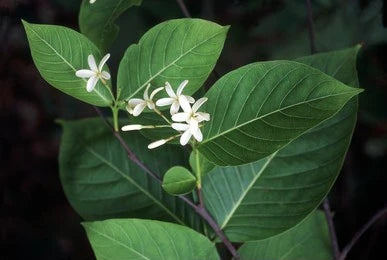The Ayurvedic term for kutaja seeds is inderjao, and this herb is well-known for treating chronic diarrhea and dysentery. This herb's properties make it both an arshoghna (cures bleeding piles) and a kandhughna (treats skin irritation). This plant has a chilly potency, a light, dry nature, and a bitter and astringent flavor. The key elements of this plant that are used include the bark, leaves, seeds, and flowers.
This herb has natural anti-oxidant, anti-diabetic, anti-fungal, anti-microbial, anti-pyretic, and anti-emetic properties. It helps alleviate bleeding piles and is used to treat persistent constipation. Additionally, it is a crucial treatment for digestive issues. It is a helpful herb that supports the body's natural healing processes and immune system.
Plant Description
In essence, a kutaja is a large shrub or glabrous, middle-sized tree. The tree has tough, dark-brown or greyish-gray bark covering it. The plant's simple, opposing, oval-shaped, dark green leaves are around 10 cm long. The plant's 2-3 cm long, less scented white blossoms are less colorful. This plant produces paired, cylindrical fruits. Numerous light brown seeds wrapped in silky hair are found inside the seeds.
Habitat
In general, this plant is indigenous to Asia and can be found all over India. It is widely dispersed in India's higher Himalayan regions at elevations of 1100 meters above sea level. Major areas of Uttar Pradesh and Assam also contain it.
Names
Latin name - Holarrhena antidysentrica
English name - Conessi tree, conessi bark
Hindi name - Kuda, kudaiya
Sanskrit name - Kutaja, kalling, inderjava, inderbeeja
Telugu name - Kodaga
Bengali name - Kurachi
Marathi name - Kuda
Gujarati name - Kuddo
Tamil name - Veppalai
Kannada name - Korachi
Malayalam name - Kodgapala
Urdu name - Kherva
Punjabi name - Kenara
Oriya name - Keruan
Uses of Indrajao
Small children who have bleeding dysentery are treated with a decoction made from inderjao and nagarmotha along with honey.
For the treatment of bleeding piles, inderjao and saunth are combined in a cold decoction.
Abdominal pain, indigestion, and low digestive fire are all treated with inderjao powder.
Vomiting can be treated with roasted inderjao powder.
The powder from kutajbeej is also used to treat chronic lung diseases like asthma.
Kutajbeej powder is applied to the teeth and gums in cases of pyorrhoea (puyedant) to ease pain and profuse bleeding.
Health Benefits
- Deepan-pachan - Inderjao aids in boosting hunger and stimulating low digestive fire. Additionally, it aids in reducing children's stomach distention, flatus, and colic pain.
- Jawarhara - It is also a helpful herb for reducing the other underlying symptoms of fever, such as cold sweats, extreme thirst, shivering, and a burning sensation.
- Krimighna - It is also utilized to eradicate dangerous ringworms and threadworms that are present in the intestines.
- Balya - This plant helps the body gain strength when used regularly. Additionally giving energy to body cells and is also helpful in overcoming general weakness.
- Pathri - It is also a highly powerful herb for people who have kidney stones. It is used to treat kidney stones and is effective against various illnesses linked to this vital body system.
- Shwaas - It aids in the elimination of phlegm and respiratory tract congestion. It is beneficial for people with asthma and chronic coughs because it lessens respiratory tract irritation.
- Rakta-arsha - Regular usage of this herb helps treat painful, bleed-causing piles by reducing swelling and irritation of the blood vessels within them.
Medicinal Properties
- The best Ayurvedic treatment for persistent diarrhea and amoebic dysentery is inderjao. It is also a helpful herb for treating a variety of newborn digestive issues. It is applied to eliminate gut worms that are dangerous.
- It aids in immune system stimulation and gives bodily cells more vigor. It functions as the body's best renewing agent, aiding in the healing of damaged cells.
- Its natural anti-oxidant properties aid in the defense against a variety of illnesses and free radicals. It is a very effective herb for treating urethritis.
- This herb's bark powder can be used as an herbal medicine to treat other dental problems as well as poor breath, bleeding, and inflamed gums.
- Inderjao has an anti-diabetic nature. This plant lowers blood sugar levels by increasing insulin levels. Additionally, it aids in controlling the body's release of insulin.
- Various skin disorders like eczema, scabies, fungal infections, and leprosy are also treated with it.
- This herb is helpful for people with arthritis and gout since it also lessens joint pain, inflammation, and stiffness.
- In addition to treating indigestion, sour blenching, and abdominal distention, it aids in the fight against persistent constipation.
- It aids in accelerating the healing process, and an external paste made from this plant can be used to treat skin ulcers and infected wounds.
- This plant has a strong ability to combat malignant cells. Treatment for oral, intestinal, lung, and breast cancer is effective.
- It aids in defending our kidneys against the damaging effects of microorganisms and renal stones.
- This excellent herb can be made into a decoction to help with anorectal issues.
Dosage
Bark powder - 1-3gm
Fruit powder - 1-3gm
Cold decoction - 10-20ml

